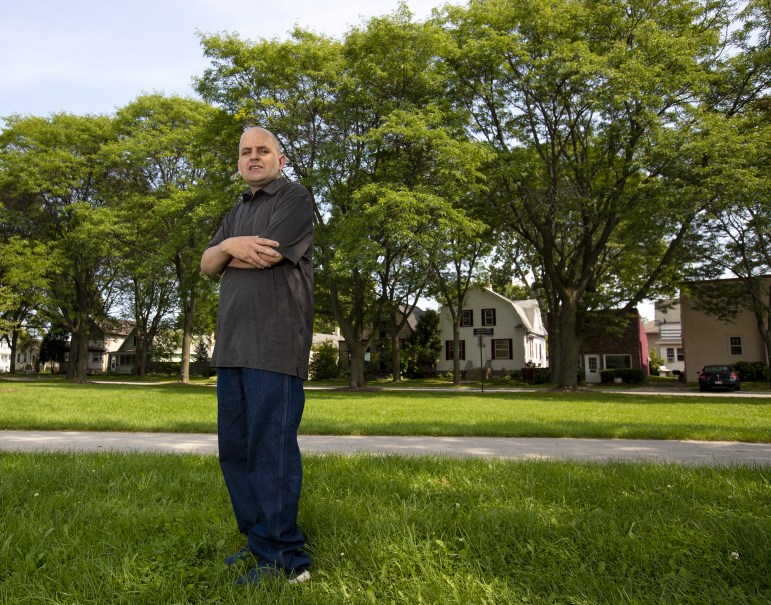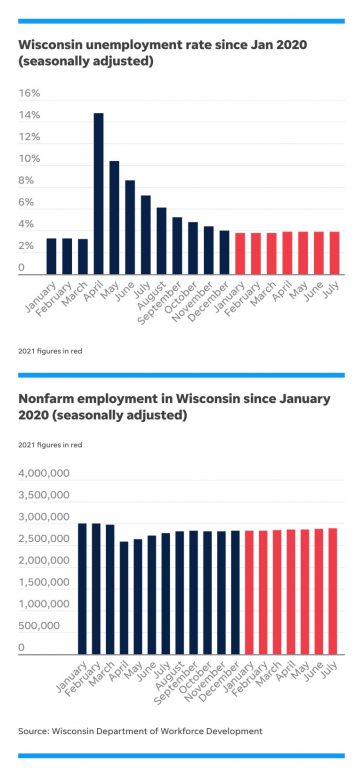Will Pandemic Benefits’ End Ease Worker Shortage?
Research iffy on whether extended unemployment benefits created disincentive to work.

Jarrett Brown of Green Bay, Wis., calls federal supplements to state unemployment benefits “a life line” that helped him as he looked for new jobs during two periods of unemployment due to the coronavirus pandemic. The current $300-a-week federal payment, which critics claim has kept workers out of the job market, ends Saturday. Credit: Samantha Madar / Green Bay Press-Gazette
Green Bay resident Jarrett Brown, a labor activist and former union steward, believes there’s dignity and pride in work.
He never applied for unemployment benefits in nearly two decades of working — until the pandemic. He was unemployed from June to September 2020 and again from December to March.
He became one of many Americans receiving unemployment insurance payments during the pandemic, including the expanded unemployment insurance benefits from the federal government.
“It wasn’t like a windfall. It wasn’t like I was getting rich or anything, but it definitely made it a lot easier to get by than it would have without it, for sure,” Brown said.
Faced with a workforce shortage in some low-wage industries, 22 states ended the $300 federal unemployment expansion early. These state governments believed the expanded benefit was discouraging people from seeking a job. Wisconsin Republicans, too, sought to end the expanded benefits until Gov. Tony Evers vetoed their bill in June.
Economists have been split on the extent to which higher unemployment checks are holding back job seekers. Some studies say ending expanded benefits did not discourage employment, while others say it slightly increases employment.
The expiration of the enhanced benefit renews the question: Will the expiration boost employment in industries like restaurants, retail and manufacturing that have struggled to attract workers? Or will that effect fall short because of other factors, like workers’ changing expectations from employers and a longstanding demographics-driven labor shortage?
Brown said the extra benefits didn’t prevent him from looking for work. While unemployed, he treated his job hunt as a full-time job. He finds it hard to believe people would pass up a good job because of the federal money.
“I value work. I value being able to contribute, and I value being able to earn my own money. And so for me, that $300 isn’t enough to make me not want to search for work,” Brown said.
Will ending benefit boost employment levels?
Wisconsin faces a shortage of workers in several industries, including restaurants and retail. There are more than 110,000 job postings on the Job Center of Wisconsin website. Wisconsin was already headed toward a workforce shortage with an aging workforce, but for many baby boomers the pandemic sped up the decision to retire.
Facing similar workforce shortages, more than half of U.S. states pulled out of expanded unemployment benefits program early. The research is still developing on whether and to what extent those moves affected employment in those states.
An Aug. 20 report from the University of Wisconsin-Madison’s Center for Research on the Wisconsin Economy found the 22 states that ended expanded unemployment in June saw non-farm employment grow faster than the rest of the U.S. after the additional unemployment benefit ended.
That UW-Madison report, which cautioned that the report’s data covers only a short time period, used Bureau of Labor Statistics monthly household and payroll employment surveys.
Economists surveyed by the University of Chicago’s Initiative on Global Markets are split on whether the additional payments disincentivized the job hunt for lower-wage workers, with most economists saying they are uncertain.
Being paid to ‘sit on the sidelines’
A spokesperson from the state’s largest business lobby, Wisconsin Manufacturers & Commerce, pointed to June research from the Federal Reserve Bank of San Francisco which found that last year’s $600 a week supplemental payment had a moderate disincentive effect on job-finding. The study extrapolated that analysis and assessed there would be a smaller effect for the $300 weekly payment.
Nick Novak, vice president of communications and marketing for WMC, which backed the push to end enhanced unemployment benefits in Wisconsin, said member businesses are finding it hard to hire even after increasing wages and offering sign-on bonuses because they must compete with the extra unemployment payments.
“We’ve seen an unfortunate impact of these expanded benefits because the federal government is paying people to sit on the sidelines,” Novak said.
On the other hand, Laura Dresser, associate director for theCenter on Wisconsin Strategy at UW-Madison, is skeptical of claims that characterize enhanced unemployment as a disincentive.
Dresser pointed out that the San Francisco Federal Reserve study also found only a small fraction of workers receiving the previous, higher $600 CARES Act supplement in May and June 2020 would have turned down an offer to return to work at their previous wages.
Dresser said she doesn’t believe the combination of state and federal unemployment benefits is large enough to discourage workers from seeking jobs. She believes the combined state and federal unemployment payments are barely enough for a family to get by in the first place.
Wisconsin’s weekly regular unemployment insurance payments range from $54 to $370, depending upon pay in an employee’s previous job. Regular unemployment insurance plus the $300 expansion creates a $354 to $670 unemployment insurance range. If you consider those amounts relative to a 40-hour work week, that would be equivalent to between $8.85 and $16.75 an hour.
Novak at Wisconsin Manufacturers & Commerce believes unemployment recipients may be making more in some cases — or that the difference is not enough for people to accept jobs.
“If you are a potential worker, if you’re looking at the incentive of going to work full time potentially at $15, $20, or even more than $20 an hour, you also have the option to sit at home and potentially make $17 an hour,” Novak said.
Pandemic, unemployment benefits change landscape
To compete for workers, employers across the state are voluntarily raising their wages.
Dresser pointed to restaurants as one example of an industry where wages are in flux. Many restaurant workers have held two or three jobs just to make ends meet.
“And these wages have been so stagnant for so long in the restaurant sector that, in some ways, it feels like maybe this is the appropriate adjustment to making the jobs that would support a more complete life,” Dresser said.
“Many employers are really sensitive to and really design great work environments,” Dresser said. “But some haven’t paid attention as much to these things. And I think you’ll see them changing wages but also considering scheduling, benefits and the kind of supervision and support to staff — and that is ultimately good for those workers.”
Brown believes the pandemic has brought about some improvements for workers despite its challenges. Alongside higher wages, workers have seen bonuses and more flexibility to needs like child care, Brown said. He is currently working the highest paying job he’s ever had at a food processing plant, and there have been several raises since March at the company he works, Brown noted.
“Honestly, the way I saw it, I feared that the pandemic was actually going to hurt workers, because I thought it was going to make everyone more desperate to get back into the workplace and just take whatever job no matter how much they paid — but the exact opposite happened, which is a good thing,” Brown said.
Contact Nusaiba Mizan at (920)-431-8310 or nmizan@gannett.com. Follow her on Twitter at @nusaiblah. This story was produced as part of the NEW (Northeast Wisconsin) News Lab.
-
Legislators Agree on Postpartum Medicaid Expansion
 Jan 22nd, 2025 by Hallie Claflin
Jan 22nd, 2025 by Hallie Claflin
-
Inferior Care Feared As Counties Privatize Nursing Homes
 Dec 15th, 2024 by Addie Costello
Dec 15th, 2024 by Addie Costello
-
Wisconsin Lacks Clear System for Tracking Police Caught Lying
 May 9th, 2024 by Jacob Resneck
May 9th, 2024 by Jacob Resneck























First, I have no objection to the enhanced unemployment benefit. Being laid off creates enough problems as it is without people having to worry about survival. I don’t want employers to be able to take advantage of folks desperate for income. Many of the job openings are in the hospitality industry, where wage theft, lousy work schedules, and sexual harassment are common. It’s no wonder many laid off employes aren’t eager to return to a negative work environment.
Having said that, it’s telling that the examples portrayed really don’t refute employers’ arguments. Mr. Brown states the extended benefit wasn’t enough for him to “not to want to search for work.” “Searching” for work is not the same as accepting a job.
Ms. Dresser cites a federal reserve study concluding that laid off workers would have returned to a job “offering a job at their previous wages.” Again, not the same as accepting a job offer and returning to work.
My “point” is four-fold. First, let’s not base policy arguments on shaky research conclusions and a desire to demonstrate we can be “tough” with unemployed people. Let’s not be afraid of basing policy on values choices.
Second, and far more importantly, let’s make work pay through programs such as earned income credits, higher minimum wages, and enforcement of fair wage and safety standards (safety to include protection from sexual harassment).
Third, unemployment compensation should be much higher–probably about 80% of the average 40 hour employe’s weekly earnings.
And finally, implement guaranteed health care for all so that the unemployed can still access health care for themselves and their families without fear or back-breaking debt. Unemployment doesn’t make someone an inferior human being.
Germany doesn’t need “Pandemic Benefits”. The German government takes care of its people 24/7/365, every second, of every year. 99% of German taxpayer money is always spent on the people of Germany.
99% of American taxpayer money is given to billionaires, Wall Street bankers, hedge fund managers, private equity managers, military manufacturers, pharmaceutical companies, health insurance companies, never-ending war, and Israel…
America has millions of homeless people, 2 million people in prison, daily mass shootings, millions of low wage jobs with no benefits, and the most corrupt, expensive, for profit, fraud filled, corporate health care system on Earth.
Your family doctor doesn’t work for you. Your doctor works for health insurance companies like United Health Care, Humana, and Blue Cross/Blue Shield.